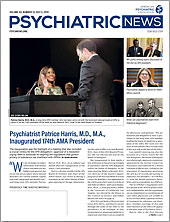Binge eating and weight problems are common challenges for patients with bipolar disorder. It’s an underappreciated connection, but one with significant clinical implications. A panel at APA’s Annual Meeting in San Francisco explored factors that increase the risk of weight problems among patients with bipolar disorder and recommended medications to reduce the risk.
According to some studies, 25% to 30% of people with bipolar disorder also have binge-eating disorder, with younger and female patients having the greatest risk of co-occurrence. However, this number may underestimate the overlap between these two diagnoses, as the threshold for binge-eating episodes required for a diagnosis of binge-eating disorder was lowered in DSM-5, explained Susan McElroy, M.D., a professor of psychiatry at the University of Cincinnati College of Medicine and a leading researcher on bipolar disorder and eating disorders. (The requirements to diagnose a patient with binge-eating disorder were lowered from a minimum of two binge eating episodes per week for six months to one episode per week for three months).
Part of the reason binge-eating disorder might be common in patients with bipolar disorder is that both disorders are associated with having periods of poor impulse control. “You tend to see lots of addictive-like behaviors in patients with bipolar disorder,” noted session chair Joel Yager, M.D., a professor of psychiatry at the University of Colorado School of Medicine.
But medications also contribute to this co-occurrence. “We know many drugs used to treat bipolar disorder [valproate, lithium, antipsychotics] can cause weight gain, but it’s less well known that these drugs can induce binge eating or make existing binge eating worse,” said McElroy. “It’s important to address such problems since conditions like obesity are often more upsetting to bipolar patients than the mood swings and contribute to medication nonadherence.”
Managing eating problems in patients with bipolar disorder can be challenging, as medications used to stabilize mood and weight often produce side effects counterproductive to the other disorder.
“I think it’s better to try and prevent weight problems in at-risk individuals [with bipolar] rather than treat problems after they occur,” said Yager. He suggested mood stabilizers such as lamotrigine or topiramate, which have weight loss, as opposed to weight gain, as a side effect (the former tends to be more effective for mood symptoms, while the latter has a stronger weight-loss effect). The anticonvulsant zonisamide used off label is another possibility.
If a patient is already stable on another medication like lithium or valproate and then develops weight problems, then a second medication for weight loss could be recommended, he said.
There are five FDA-approved medications for obesity, four of which target receptors in the brain. Of these, naltrexone-buproprion and phentermine-topiramate can sometimes induce mania or psychosis and should be avoided, McElroy advised. Lorcaserin, a serotonin receptor agonist, and liraglutide, a diabetes medication, have better side-effect profiles. However, lorcaserin can cause euphoria, and there have been reports that liraglutide may increase suicidal thoughts in some patients. The fifth weight-loss drug, orlistat, reduces fat absorption in the gut and has no known psychiatric effects, but it can cause diarrhea and other gastrointestinal problems.
And what about the stimulant lisdexamfetamine, the only approved medication for binge-eating disorder? McElroy said that while this medication is effective, it should not be given to individuals with bipolar disorder until their mood symptoms are stable; this reduces the risk of lisdexamfetamine triggering mania and ensures that any binge-eating symptoms are not due to untreated bipolar disorder. “If a patient is still binge eating after they are euthymic, then you can safely use lisdexamfetamine,” she said. ■

